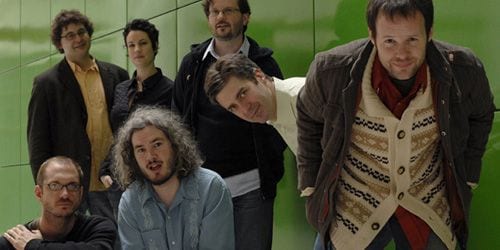
When we last heard from Rock Plaza Central, on Are We Not Horses?, they were singing of steel horses who thought they were real. But despite that admittedly eccentric subject, the songs were grounded by the deep roots of the music, and driven by the naked bark of Chris Eaton’s vocals. It was a tense collection, committing to the delusions of its equine characters, and letting them bare their teeth in want and frustration.
But the band has moved away from that tension, at least in a way, on their new record, …at the Moment of Our Most Needing. This record takes its inspiration from William Faulkner’s Light in August, and follows the novel’s main character — a pregnant girl — as she wanders off into the harsh world to make her own way. And while this album isn’t without the blinding passion of its predecessor, it gets to that feeling in a much different way. If the last album’s desire was a bone poking through the skin, here it is a coating of slick sweat over the body.
From the slow, deliberate trudge of “Oh I Can”, to the caution of “(Don’t You Believe the Words of) Handsome Men”, to the exultant brightness of “Wrong Side of the Right”, you can feel the movement of the record, of its character, through determination and doubt and isolation, all the while charging into the seething low summer sun. “I can bare a hill… if it’s peaceful and still”, Eaton sings at the album’s start, a statement as full of wishing as it is resilience, as if any obstacle can be overcome if the world would just slow down for a minute.
Much of the album works in this paradoxical way, expressing doubt and worry with certitude. When Eaton isn’t pressing for answers to impossible questions — “When we fall far from the light / Will it make our darkness bright?” he asks in “Them That Are Good, Them That Are Bad” — he sings brazenly of earthen passion. Songs like “Holy Rider” and “Wherever You Are, I’m Home” show the desire behind both the want and shame of Faulkner’s girl. If she is the album’s narrator — though when exactly Eaton is singing through her versus to her becomes nicely muddled from track to track — then she is often confused by her own inner conflict. She’s consumed by fears of self-destruction on “Oh Lord, How Many Are My Foes”, but tired with trying and ready to give in to lust on “Holy Rider”.
As she struggles with her inner demons, wading through dark emotions and trying to leave them behind, she is also on an actual journey through a world crafted by the band. As she searches for love in a world eager to clobber her at every turn, Rock Plaza Central gives us the feeling of space and of surging movement. Along with the muddy, uphill stop that surges behind Eaton, the band mixes in effective instrumentals that not only show the world of the album writ large, they also capture the oppressive heat of a summer in the South. “A Mule on Fire” is a screeching, buzzing fever dream, while “The Long Dead March” is in one way beaten down and tired, yet is also clarion clear in its melody. To hear these emotive sounds lined up one after another is to eventually be as exhausted and heart-weary as a girl lost.
Which is what makes “The Hot Blind Earth”, the album’s closer, so conflicted and brilliant. “Your love’s the light”, the band shouts together, and it sounds for all the world like a faithful declaration. At least at first. Then, as the phrase gets repeated, a bitter resignation floats into the periphery of their voices. As if that love, for our girl, is both a reason to press on and an unwanted fate, one that won’t end well for her. But, as on their last album, this band fully captures the conflicted heart of a person — or people — who press on in the face of that kind of let down. …at the Moment of Our Most Needing is a sweetly tiring listen, in the way that it pulls you into its world and makes you work its land. But there are rewards to be found in that investment. Because it is, in the end, a bracing album of hope, of pushing past your heartache even in the direst of circumstances, and the sound of that hope is bold and dusty with living.

![Call for Papers: All Things Reconsidered [MUSIC] May-August 2024](https://www.popmatters.com/wp-content/uploads/2024/04/all-things-reconsidered-call-music-may-2024-720x380.jpg)



